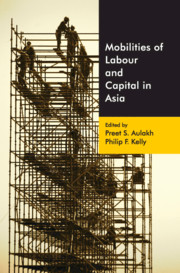Book contents
- Frontmatter
- Contents
- List of Figures
- List of Tables
- List of Appendices
- Acknowledgements
- 1 Introduction: Conceptualizing Labour and Capital Mobilities In and Out of Asia
- SECTION I From Capital to Labour Mobility
- SECTION II From Labour to Capital Mobility
- 7 Skills Development Initiatives and Labour Migration in a Secondary Circuit of Globalized Production: Evidence from the Garment Industry in India
- 8 The Counter Geographies of Globalization: Women's Labour Migration along the Nepal–Persian Gulf Migratory Corridor
- 9 Migration and Developmental Capital in a Punjab Village
- 10 The Production of Nurses for Global Markets: Tracing Capital and Labour Circulation In and Out of Asia
- 11 The Mobility–Oligopoly Nexus in Philippine Property Development
- Notes on Contributors
- Index
9 - Migration and Developmental Capital in a Punjab Village
from SECTION II - From Labour to Capital Mobility
Published online by Cambridge University Press: 24 December 2019
- Frontmatter
- Contents
- List of Figures
- List of Tables
- List of Appendices
- Acknowledgements
- 1 Introduction: Conceptualizing Labour and Capital Mobilities In and Out of Asia
- SECTION I From Capital to Labour Mobility
- SECTION II From Labour to Capital Mobility
- 7 Skills Development Initiatives and Labour Migration in a Secondary Circuit of Globalized Production: Evidence from the Garment Industry in India
- 8 The Counter Geographies of Globalization: Women's Labour Migration along the Nepal–Persian Gulf Migratory Corridor
- 9 Migration and Developmental Capital in a Punjab Village
- 10 The Production of Nurses for Global Markets: Tracing Capital and Labour Circulation In and Out of Asia
- 11 The Mobility–Oligopoly Nexus in Philippine Property Development
- Notes on Contributors
- Index
Summary
Introduction
India ranks among the top recipients of remittances from people settled in Western countries. The Punjabi community, scattered in different parts of the world, has been actively engaged in sending back remittances to family members in the homeland. The diaspora community has also contributed significantly to the development of their ancestral villages. When diaspora philanthropists sponsor projects in their ancestral homeland, they do not just make capital indiscriminately available for local use; rather, they fund particular kinds of activities that they consider necessary and valuable.
Scholars of migration have shown that historically and in the contemporary period, migration shapes the lives of people both in the places of origin and in places of destination. Migrant communities must, therefore, be studied as ‘transnational’ because they cross different kinds of boundaries, in terms of movements of goods, people, ideas, and cultures, creating and transforming spaces across the globe. It is this framework of the ‘transnational’ nature of migrants that I examine through my work on Punjabi migrants and the diverse links they maintain across national/ transnational boundaries. In Punjab, I selected Kharoudi village because of its transnational movements and the connections which migrants maintain with this village, especially the connections which are apparent in the form of capital flows that have driven development processes in the village.
Remittances and Development
Diasporic communities are globally spread but at the same time linked back to their homelands. People from developing nations, such as Pakistan, Bangladesh, Sri Lanka, Philippines, and India, move to various Western countries, such as the USA, the UK, Canada, and Europe. In the case of Pakistan, transnational migration of Mirpuri Muslims to Britain not only brings economic capital into the area through the flow of remittances, but also facilitates significant social development through the construction of schools, hospitals, and so on (Ballard, 2004).
Vertovec (2007) demonstrates that remittances are sent by all types of migrant workers—male and female, legal and illegal, permanent and temporary, low-skilled and highly skilled. They can be transferred through various modes such as banks, agencies, directly through the Internet, through professional couriers, or through the social networks of the migrants. Remittances influence the lives of local people who are left behind and transform the sociocultural settings of people in the homeland with respect to their status hierarchies, gender relations, patterns of marriages, and user habits.
- Type
- Chapter
- Information
- Mobilities of Labour and Capital in Asia , pp. 194 - 210Publisher: Cambridge University PressPrint publication year: 2020



